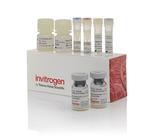Search Thermo Fisher Scientific
FIGURE: 1 / 4
Human CEA ProQuantum Immunoassay Kit




Product Specifications
Analytical sensitivity
Assay range
Sample type/volume
Hands-on time
Time-to-result
Homogenous (no wash)
Instrument
Product size
Contents
Antibody-Conjugate A
Antibody-Conjugate B
Antibody-Conjugate Dilution Buffer
Standard
Master Mix
Ligase
Shipping conditions
Storage
Protein name
Species (tested)
Assay kit format
Label or dye
About This Kit
The ProQuantum Human CEA Immunoassay Kit is designed to provide quantitative measurements of human CEA in small sample volumes. Utilizing proximity-based amplification technology, the assay combines the analyte specificity of high-affinity antibody-antigen binding with the signal detection and amplification capabilities of real-time PCR to achieve a simple yet powerful next-generation protein quantitation platform. A user-friendly workflow combined with intuitive software for analytics enables sample-to-answer in just 2 hours.
• High sensitivity-detect low levels of protein with greater sensitivity than traditional methods
• Broad dynamic range-5 logarithmic units, minimizing sample dilutions to ensure they fall within the range
• Small sample consumption-use 2-5 µL of sample (compared to 75 µL for triplicate wells with other methods)
• Fast, easy workflow-2 hours from sample to answer, with no wash steps
• No proprietary instrument to purchase-runs on any real-time PCR instrument
ProQuantum immunoassays utilize a matched pair of target-specific antibodies, each conjugated to a DNA oligonucleotide. During antibody-analyte binding, the two DNA oligos are brought into close proximity, which allows for ligation of the two strands and subsequent creation of a template strand for amplification. This platform leverages the sensitivity and large dynamic range of Applied Biosystems TaqMan real-time PCR technology (Figure 1).
The assay workflow is fast and easy-2 steps in 2 hours. There are a total of 7 components in each kit (Figure 2). First, mix the antibody-conjugates, dilute the sample, and create the standard curve in a working plate. Then, using a multi-channel pipette, add the antibody-conjugates and sample (or standard) into the wells of a PCR plate and incubate for 1 hour. Combine the master mix and ligase and add to the wells of the PCR plate, then run the plate on any qPCR instrument. After the run is complete, import the results file into the ProQuantum software (cloud-based version at https://apps.thermofisher.com/apps/proquantum). Using this software, the data can be analyzed easily to obtain protein concentration values. The software allows you to set up standard curves, design plate layouts, apply a 5PL weighted algorithm, and obtain robust statistical group-wise comparisons.
CEA (Carcino Embryonic Antigen, CD66e) is synthesized during development in the fetal gut, and re-expressed in increased amounts in intestinal carcinomas and several other tumors. CEA is a member of carcinoembryonic antigens, immunoglobulin supergene family and consists of a single N domain (structural homology to the immunoglobulin variable) and six immunoglobulin constant-like A (A1, A2, A3) and B domains (B1, B2, B3). Antibodies to CEA are useful in identifying the origin of various metastatic adenocarcinomas and in distinguishing pulmonary adenocarcinomas (60 to 70% are CEA+) from pleural mesotheliomas (rarely or weakly CEA+). CEA is a member of a large family of glycoproteins, a useful tumor marker for adenocarcinoma, and found in adenocarcinomas of endodermally derived digestive system epithelium and fetal colon. Two subgroups of the CEA family, the CEA cell adhesion molecules and the pregnancy-specific glycoproteins, are located within a 1.2 Mb cluster on the long arm of chromosome 19. Eleven pseudogenes of the CEA cell adhesion molecule subgroup are also found in the cluster. CEA was originally described in bile ducts of liver as biliary glycoprotein. Subsequently, CEA was found to be a cell-cell adhesion molecule detected on leukocytes, epithelia, and endothelia. The encoded protein mediates cell adhesion via homophilic as well as heterophilic binding to other proteins of the subgroup. Multiple cellular activities have been attributed to the encoded protein, including roles in the differentiation and arrangement of tissue three-dimensional structure, angiogenesis, apoptosis, tumor suppression, metastasis, and the modulation of innate and adaptive immune responses. Multiple transcript variants encoding different isoforms have been reported, but the full-length nature of all variants has not been defined.
For Research Use Only. Not for use in diagnostic procedures. Not for resale without express authorization.
References (0)
Bioinformatics
Gene aliases : CD66e, CEA, CEACAM5
Gene ID : (Human) 1048
Gene symbol : CEACAM5
Protein Aliases : Carcinoembryonic antigen, Carcinoembryonic antigen-related cell adhesion molecule 5, CD66e, CEA, Meconium antigen 100
UniProt ID (Human) P06731

Performance Guarantee
If an Invitrogen™ antibody doesn't perform as described on our website or datasheet,we'll replace the product at no cost to you, or provide you with a credit for a future purchase.*
Learn more
We're here to help
Get expert recommendations for common problems or connect directly with an on staff expert for technical assistance related to applications, equipment and general product use.
Contact tech support